
Written by and published on https://www.buzzfeed.com/.
It’s almost counter-intuitive. You’re looking forward to a swim in the big, beautiful, community pool and then you see a sign in the locker room advising you to take a shower before entering the pool. Is it really necessary? After all, you just want to get in the pool. As the weather heats up and thoughts turn to swimming and cooling off in the pool, the Water Quality & Health Council is highlighting a contradictory finding from our recent swimmer hygiene survey. We discovered that although the vast majority of American adults (93 percent) would never reuse someone else’s bath water, over 40 percent skip the shower before entering the swimming pool. Can you say “communal bathing”?
This Is Why You Should Always Shower Before Swimming
According to a new report, most adults swim after having diarrhea. THIS IS WHY WE CAN’T HAVE NICE THINGS.
Here to spoil all the fun: a new report that basically found out pools are full of diarrhea.
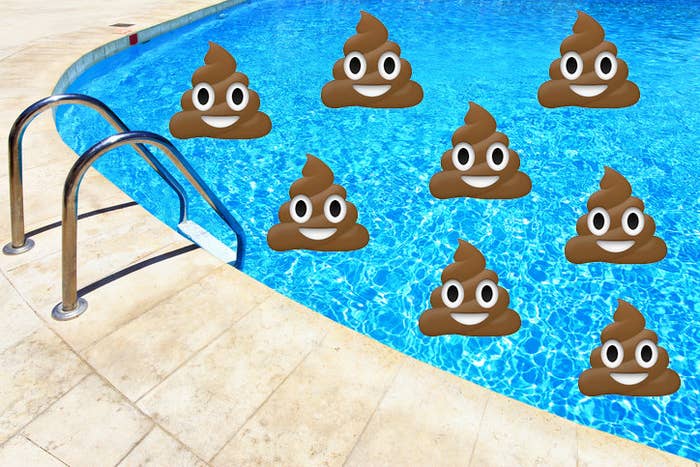
The survey, conducted by the Water Quality and Health Council, found the following:
* 1 in 4 adults (25%) would swim within one hour of having diarrhea.
* Half of adults (52%) seldom or never shower before swimming in a pool.
* 3 in 5 adults (60%) admit to swallowing pool water while swimming.
Before we get into these findings, let’s quickly talk about pool germs. When you get in a pool, everything on your body — sweat, dirt, oil, bodily fluids — ends up in the water, like a big bathtub. So yes, most pools are full of germs, and for the most part it’s not a big deal. We don’t live in a sterile world and most germs are harmless. Plus, we have chemicals like chlorine to keep pools clean.
However, there are bad germs that you do not want in a pool — these are pathogens, or any bacteria, virus, or other organism that causes infection or disease. These can get in the pool from our bodies or fecal matter and infect other swimmers, leading to outbreaks of waterborne diseases.
So apparently 1 in 4 adults would hop in a pool within an hour of having diarrhea — but you’re actually supposed to wait two weeks to avoid contaminating the pool.
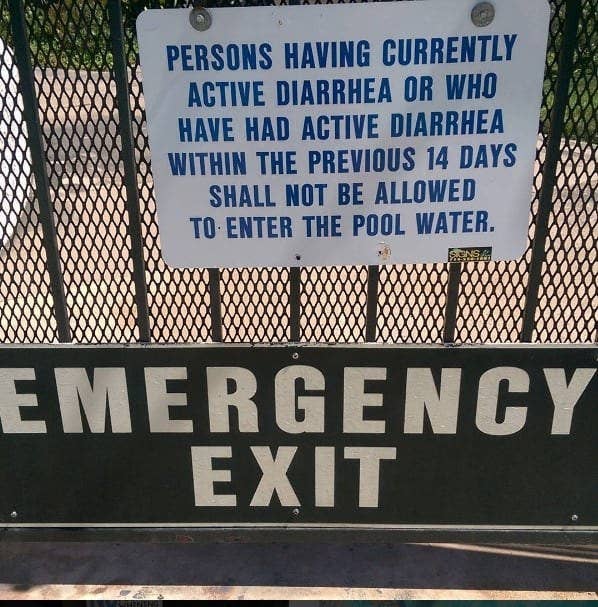
“Even if you feel better and you don’t have symptoms, you can still be shedding millions, even billions, of diarrhea germs into the pool,” Kelly Reynolds, PhD, germ expert at the University of Arizona, previously told BuzzFeed Health.
Unfortunately, not many people know about the two-week rule nor do they follow it. Given that about 129 million people are swimming in pools each summer and 25% of adults would swim right after having diarrhea, that means the risk of contamination is pretty high. This is why it’s key to shower before swimming and avoid swallowing pool water — but people don’t always follow those rules either, which we’ll get to in a bit.
Diarrhea is a problem because it can contaminate the entire pool with pathogens and make other swimmers sick.
We already know that pools contain fecal matter — and it’s not just from kids having accidental poops. We all have a little residual feces on our bodies, unless we’re literally soaping up or using a bidet continuously throughout the day.
“Adults shed an average of 0.14 grams of feces each swim, which is equivalent to the weight of one pea,” Reynolds previously told BuzzFeed Health. Children shed even more poop — and don’t even get us started on those “swim diapers.”
But unlike regular poop, diarrhea often contains pathogens. These include bacteria (E. coli, shigella, campylobacter), viruses (hepatitis A, typhoid), and parasites (giardia, cryptosporidium). These diarrheal pathogens spread through contaminated water, food, or surfaces via the fecal-oral route.
The biggest concern is a nasty parasite called Cryptosporidium, which is the most common cause of diarrheal illness and pool outbreaks.
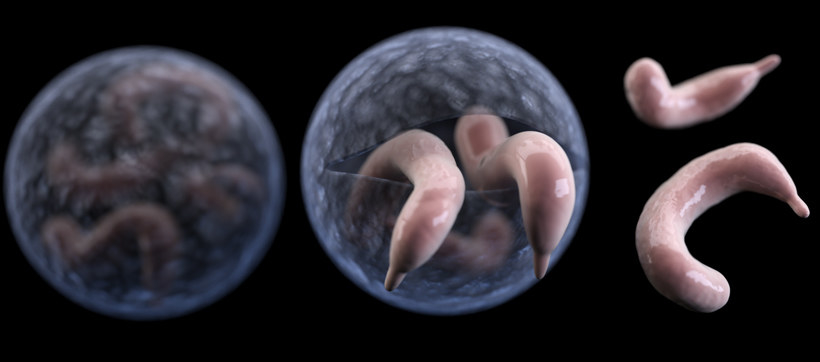
Crypto spreads when someone swallows pool water that’s contaminated from diarrhea shed by an infected swimmer. It only takes a small number of crypto germs to make someone sick. Crypto can cause diarrhea, nausea, lack of appetite, vomiting, weight loss, stomach cramps or pain, and fever.
Even in people with healthy immune systems, Crypto can remain in your intestine and cause symptoms for weeks; there’s no cure or antibiotic, so you just have to wait it out. It usually goes away on its own, but it can cause serious problems in people with weakened immune systems, like people with HIV/AIDs.
Despite how common it is, the parasite isn’t very well known — 72% of adults in this survey didn’t know that Crypto was a parasite often spread in water. And it can shed from your body through fecal matter for weeks, even after you feel better.
Sure, chlorine is great at destroying germs — but Crypto is actually chlorine-tolerant and can live in pools for days.
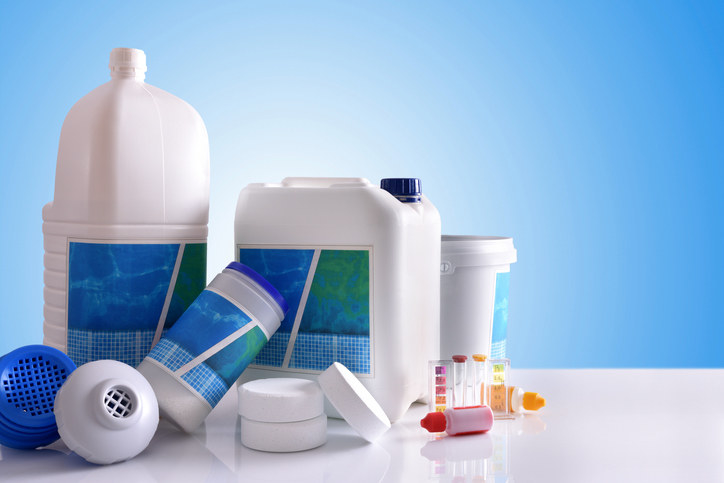
According to the CDC, Crypto has a tough outer shell that allows it to survive in pools even if they’re properly chlorinated.
“Crypto is not easily killed by chlorine and can live up to 10 days in well-treated pools,” Michele Hlavsa, chief of the CDC’s Healthy Swimming program, said in the report. This is why it is important to keep the parasite out of pools in the first place, since it’s so difficult to remove.
Washing your body (ahem, nether regions) can reduce the risk of contamination, but most people aren’t showering before swimming.
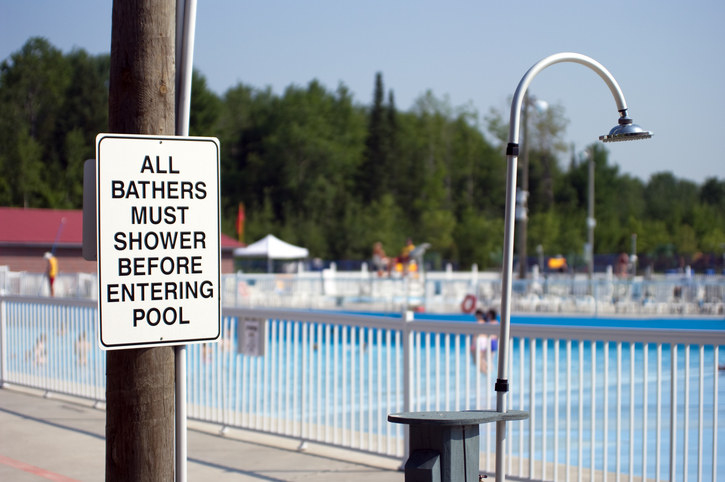
It might seem counterintuitive to shower before jumping in the water, but think about it — if you don’t rinse off, the pool basically becomes a giant bathtub of dirty bodies.
Not to mention, the chlorine in the pool gets depleted by things like sweat, sunscreen, and skin or hair products — so you want to rinse those off before you dive in.
But according to this report, Americans are particularly bad at pre-pool showering, so it’s a habit everyone should be more conscious about. Even if it seems annoying, it really reduces the risk that you’ll contaminate a swimming pool with pathogens from your body. So think about showering as helping keep you and your fellow swimmers safe and healthy.
You should also avoid ingesting any pool water, which is actually harder than you’d think.
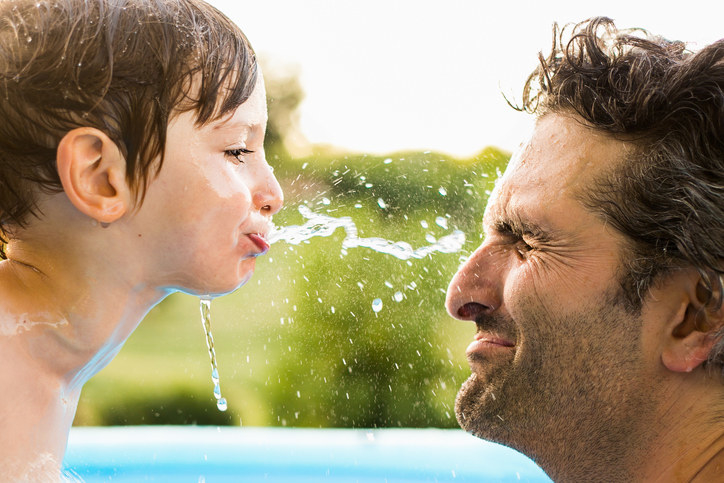
“Adults ingest on average half an ounce of water every time they swim, while kids usually swallow double that,” Reynolds previously told BuzzFeed Health. Even if you aren’t deliberately swallowing the water, it can still get in your mouth from splashing, diving, and spitting water.
Think about how you avoid using tap water, even for brushing your teeth, in countries without water sanitation. You should adopt the same mindset and take similar precautions with pool water. It only takes a little bit of contaminated pool water to get in your system and make you sick.
So to sum up: Follow the two-week rule after a bout of diarrhea. Always shower before you hop in the pool. And don’t swallow pool water, because no one can be trusted to follow these rules.
Even if you’ve never gotten sick from a contaminated pool and don’t think it’ll happen to you, it’s still good to follow these practices for the greater good.
Keeping a pool clean, and therefore fun, for everyone really depends on swimmers being considerate of one another and following the rules. And we’re talking about public and private pools here, so don’t think you’re off the hook if you’re swimming in your own backyard.
If you have a pool or you’re worried about your own, you can get a free testing kit through the Water Quality and Health Council (click here to get one). The kit allows you to quickly test any pool to ensure proper pH and chlorine levels.
Happy swimming!
Original post here https://www.buzzfeed.com/carolinekee/swimming-pools-are-full-of-diarrhea.


